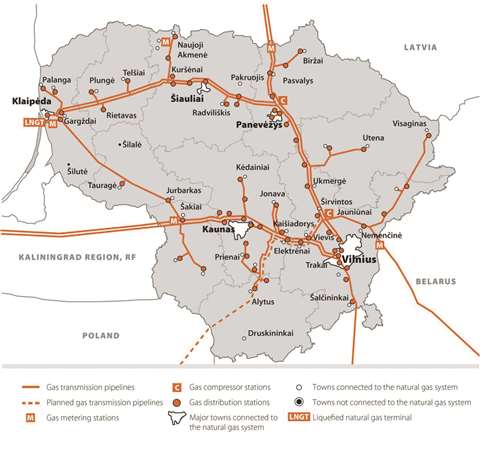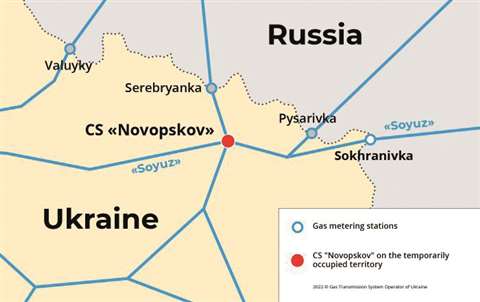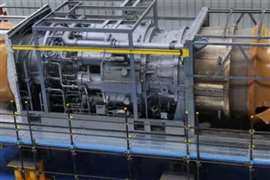Euro Gas Report: Lithuania halts Russian gas imports
April 21, 2022
Lithuania stops all Russian gas imports
 Lithuanian gas demand will now be met through imports via the Klaipeda LNG terminal.
Lithuanian gas demand will now be met through imports via the Klaipeda LNG terminal.
Lithuania’s Ministry of Energy announced that it would no longer import natural gas from Russia. This makes it the first European country to secure its energy independence from Russia in the wake of the war in Ukraine.
The ministry said that all Lithuanian gas demand would now be met through imports via the Klaipeda LNG terminal, with three cargoes scheduled to arrive each month. It added that additional supplies could be brought in via the gas pipeline link with Latvia and, from May 1, through the new Gas Interconnection Poland-Lithuania (GIPL) pipeline.
In a separate statement the ministry said it was seeking to increase energy co-operation with Poland in the context of current geopolitical challenges.
Meanwhile, Lithuania’s gas transmission system operator, Amber Grid, said that it had signed contracts for the upgrade of two gas distribution stations in Šiauliai and Telšiai. The work will be carried out by Alvora UAB and is due to be completed in mid-2023.
The Šiauliai and Telšiai gas distribution stations are undergoing gas metering and pressure reduction to the level required by the distribution system operator. Other important technological processes at the station include gas cleaning, reheating and odorization, i.e. odorization for security purposes.
The Lithuanian gas transmission system operated by Amber Grid consists of 2,285 km of underground gas pipelines, 64 gas distribution stations, 4 gas metering stations and 2 compressor stations.
Ukraine’s transmission operator warns of “gross interference” at compressor station

The Gas Transmission System Operator of Ukraine (GTSOU) warned that “gross interference” by Russian forces and separatist fighters in the Luhansk region could affect operations at a gas compressor station and flows via Ukraine to Europe.
The operator said that the Novopskov compressor station was an important part of the network supplying gas to the Donetsk and Luhansk regions. Nearly one-third of gas transit to Europe via Ukraine is also transported through the Novopskov station, it added.
According to the operator, the station has been under occupation, and the occupiers have been engaging in actions such as changing the operation of communication equipment and technological modes. The GTSOU warned that these actions could result in the loss of operational control over equipment at the compressor station, which it said would lead to “significant risks” to the integrity of the Ukrainian gas transmission system.
The operator called on the occupiers to “refrain from further pressure on GTSOU employees” and interference in the compressor station’s operations. It said that in the event of the loss of operational control at Novopskov, it would be forced to halt operations at the facility in order to protect the integrity of Ukraine’s gas transmission system.
“Responsibility for the consequences falls on the Russian Federation,” the GTSOU stated.
Moscow has said that it guarantees the safety of all operations and equipment at Novopskov.
OGE unveils plan for pipeline link to Wilhelmshaven LNG terminal
Open Grid Europe (OGE) has unveiled plans to build a 30-km (19-mile) pipeline link to the proposed LNG import terminal at Wilhelmshaven in Germany. The link would connect Wilhelmshaven to the long-distance NETRA gas pipeline at a point near the Etzel underground storage facility.
OGE intends to build the link by the end of 2022 and said it would have an initial capacity of 353 Bcfy (1 x 1010 m3/y), with potential for expansion to 989 Bcfy (2.8 x 1010 m3/y) at a later date. According to Reuters, the pipeline would be designed to allow for transportation of hydrogen in the longer term as the European Union works to boost the share of clean hydrogen – such as green hydrogen, produced using renewable energy – in the regional energy mix.
The Wilhelmshaven terminal is one of three proposed LNG import facilities in Germany on which development is being accelerated as the country scrambles to reduce its dependence on Russian gas in the wake of the war in Ukraine. On March 30, the country also triggered an emergency plan to manage gas supplies in the event of a disruption.
Tree Energy Solutions (TES) said in late March that it would accelerate development of the terminal so that it would now enter service in 2025. The company sees LNG as an “intermediate source” of energy supply for the project and intends to convert it to “green gas” imports – specifically green hydrogen – over the longer term.
Separately, TES announced on April 4 that it was partnering with OGE to build a carbon dioxide (CO2) pipeline system that will connect the Wilhelmshaven terminal to “industrial, power and mobility locations” around Germany. The network, which will initially be 1,000 km (621 miles) long with a capacity of 18mn metric tonnes of CO2, will be focused on the reuse of CO2 in a “green circular system” to import green hydrogen.
Italy strikes deal to ramp up Algerian gas imports
Italy struck a deal on April 11 to increase its natural gas imports from Algeria by around 40% as it seeks to reduce its reliance on gas from Russia in the wake of the war in Ukraine.
The agreement represents Italy’s first major deal to find alternative supplies, and others are expected to follow according to comments from Italian Prime Minister Mario Draghi. The country has been sourcing around 40% of its gas imports from Russia. Draghi previously said while replacing 30-40% of supplies from Russia could be done immediately, replacing the remainder would be significantly more challenging.
Under the new deal, Italy’s Eni will ramp up shipments via the Transmed pipeline until they reach 318 Bcf/y (9 x 109 m3/y) in 2023-24. Italian Minister for Ecological Transition Roberto Cingolani said on Italian television that 106 Bcf (3 x 109 m3) of this would come online immediately.
The Transmed pipeline has a capacity of more than 3.9 Bcf/d (1.1 x 108 m3/d) but currently only transports around 2.1 Bcf/d (6 x 107 m3/d).
The day after the deal was announced, it was reported that diplomats from Italy and Spain were holding talks over concerns that Spain’s access to additional gas from Algeria could be affected by additional volumes flowing to Italy. Bloomberg cited anonymous sources familiar with the matter as saying that senior Spanish and Italian officials intended to meet again for further talks later in April.
Lithuania stops all Russian gas imports
Lithuania’s Ministry of Energy announced that it would no longer import natural gas from Russia. This makes it the first European country to secure its energy independence from Russia in the wake of the war in Ukraine.
The ministry said that all Lithuanian gas demand would now be met through imports via the Klaipeda LNG terminal, with three cargoes scheduled to arrive each month. It added that additional supplies could be brought in via the gas pipeline link with Latvia and, from May 1, through the new Gas Interconnection Poland-Lithuania (GIPL) pipeline.
In a separate statement the ministry said it was seeking to increase energy co-operation with Poland in the context of current geopolitical challenges.
Meanwhile, Lithuania’s gas transmission system operator, Amber Grid, said that it had signed contracts for the upgrade of two gas distribution stations in Šiauliai and Telšiai. The work will be carried out by Alvora UAB and is due to be completed in mid-2023.
The Šiauliai and Telšiai gas distribution stations are undergoing gas metering and pressure reduction to the level required by the distribution system operator. Other important technological processes at the station include gas cleaning, reheating and odorization, i.e. odorization for security purposes.
The Lithuanian gas transmission system operated by Amber Grid consists of 2,285 km of underground gas pipelines, 64 gas distribution stations, 4 gas metering stations and 2 compressor stations.
Ukraine’s transmission operator warns of “gross interference” at compressor station
The Gas Transmission System Operator of Ukraine (GTSOU) warned that “gross interference” by Russian forces and separatist fighters in the Luhansk region could affect operations at a gas compressor station and flows via Ukraine to Europe.
The operator said that the Novopskov compressor station was an important part of the network supplying gas to the Donetsk and Luhansk regions. Nearly one-third of gas transit to Europe via Ukraine is also transported through the Novopskov station, it added.
According to the operator, the station has been under occupation, and the occupiers have been engaging in actions such as changing the operation of communication equipment and technological modes. The GTSOU warned that these actions could result in the loss of operational control over equipment at the compressor station, which it said would lead to “significant risks” to the integrity of the Ukrainian gas transmission system.
The operator called on the occupiers to “refrain from further pressure on GTSOU employees” and interference in the compressor station’s operations. It said that in the event of the loss of operational control at Novopskov, it would be forced to halt operations at the facility in order to protect the integrity of Ukraine’s gas transmission system.
“Responsibility for the consequences falls on the Russian Federation,” the GTSOU stated.
Moscow has said that it guarantees the safety of all operations and equipment at Novopskov.
Oil Plus wins North Sea platform maintenance contract
UK-based Oil Plus has won a contract with an unnamed North Sea operator for a topsides maintenance resilience and equipment reliability program. The program is aimed at boosting operational efficiency on one of the operator’s platforms.
Oil Plus said the contract was worth around GBP2.5mn ($3.3mn) and that it would look at areas including power generation, gas compression and seawater lift systems under the program.
This is the first project for Oil Plus’ new maintenance and vulnerabilities team, which was set up specifically to support operators that acquire mature assets by providing equipment maintenance planning and offshore technical repair resources over the course of the handover period.
Baker Hughes to provide hydrogen-ready turbo-compression for Greek pipeline
Baker Hughes announced on March 31 that it had won a contract from TERNA, the construction unit of GEK TERNA Group, to supply gas turbines and compressors that can run on a blend of natural gas and hydrogen. The compressors would be installed at a new compression station on Greece’s natural gas transmission system.
According to the company’s announcement, Baker Hughes will supply three compression trains for a total of three NovaLT12 hydrogen-ready gas turbines and three PCL compressors. It said the technology for this project had been designed to allow the station to transport a blend of up to 10% hydrogen.
The project follows a separate collaboration between Baker Hughes and Italy’s Snam in 2020, when the two introduced the NovaLT12 turbine to Snam’s Italian pipeline network. That marked the first time a hybrid hydrogen turbine had been integrated into a natural gas pipeline system.
The new Greek compressor station is due to enter service in 2024, and Baker Hughes said it was in line with the EU’s Hydrogen Strategy goals to accelerate the development of clean hydrogen and increase its share of the energy mix. Hydrogen forms part of the EU’s strategy for reaching net zero emissions by 2050.
Baker Hughes said its experience in the treatment of hydrogen began in 1962 with its first hydrogen compressor. Today, the company’s technologies serve the entire hydrogen value chain, from production to transportation and utilization. The company’s portfolio includes advanced compressors, gas turbines, valves, centrifugal pumps, non-metallic pipes, hydrogen sensors, monitoring and diagnostics including inspection solutions for hydrogen embrittlement in production and storage, as well as clean, integrated power solutions to produce power with hydrogen and hydrogen blends.
The design of the NovaLT12 allows for blends of between 5% and 100% hydrogen; the entire NovaLT family of gas turbines is 100% designed and manufactured in Baker Hughes plants in Italy.
MAGAZINE
NEWSLETTER

CONNECT WITH THE TEAM








